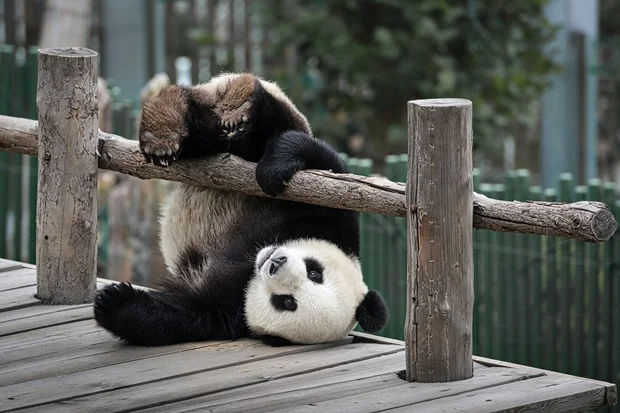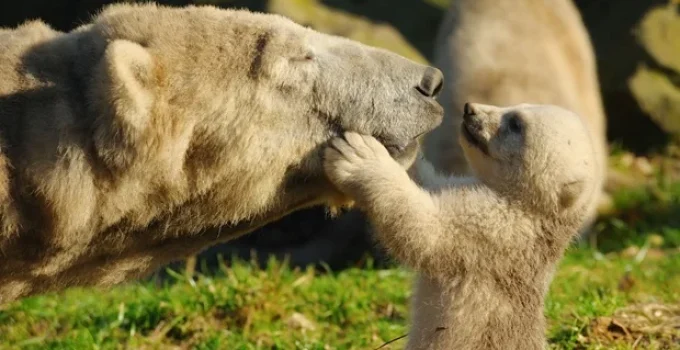❄️Are Bears Mammals?
The answer: Yes! Bears are mammals—just like us. But what makes them mammals? And what makes them unique? Let’s break it down.
🔬 What Makes an Animal a Mammal?
Mammals are a group of animals that share several key traits. To be considered a mammal, an animal must:
- Have mammary glands (milk-producing glands) and nurse their young
- Be warm-blooded (endothermic)
- Have hair or fur at some point in life
- Possess three middle ear bones and a neocortex (a part of the brain)
- Typically give live birth (though there are exceptions like the egg-laying platypus)
Bears check every single box!
🧬 The Bear Family Tree
All bears belong to the family Ursidae, which includes eight living species. They’re part of the mammalian order Carnivora, although many are omnivores (and some are downright picky eaters—looking at you, pandas).
🐾 Meet the Bears

✅ Brown Bear (Ursus arctos)
- Nickname: The Versatile Giant
- Habitat: North America, Europe, Asia
- Fun Fact: Subspecies include the famous grizzly bear and Kodiak bear—one of the largest carnivorous land mammals!
✅ Polar Bear (Ursus maritimus)
- Nickname: The Ice King
- Habitat: Arctic Circle—sea ice, coasts, and islands
- Fun Fact: Technically, marine mammals, they spend most of their days on sea ice hunting seals.
✅ Giant Panda (Ailuropoda melanoleuca)
- Nickname: The Bamboo Specialist
- Habitat: Mountain forests of central China
- Fun Fact: Despite being classified as carnivores, pandas eat 99% plants—mostly bamboo!
✅ American Black Bear (Ursus americanus)
- Nickname: The Forest Wanderer
- Habitat: North America—from Alaska to Mexico
- Fun Fact: They come in a variety of colors, including black, brown, cinnamon, and even blonde!
✅ Asiatic Black Bear (Ursus thibetanus)
- Nickname: The Moon Bear
- Habitat: Forests of Asia—from the Himalayas to Japan
- Fun Fact: Excellent tree climbers and often build nests in branches to rest.
✅ Sloth Bear (Melursus ursinus)
- Nickname: The Insectivore
- Habitat: India, Nepal, Sri Lanka
- Fun Fact: Has a long snout and lips adapted for sucking up termites and ants—like a vacuum cleaner!
✅ Sun Bear (Helarctos malayanus)
- Nickname: The Honey Bear
- Habitat: Tropical forests of Southeast Asia
- Fun Fact: The smallest bear species, with a long tongue (up to 10 inches) perfect for slurping honey and insects.
✅ Spectacled Bear (Tremarctos ornatus)
- Nickname: The Andean Bear
- Habitat: Andes Mountains of South America
- Fun Fact: The only bear native to South America—named for the unique light-colored markings around its eyes.
🔍 What Makes Bears Unique Among Mammals?
- Hibernation: Many bears hibernate, slowing their heart rate and conserving energy through winter.
- Plant-Eaters in a Carnivore Order: Bears evolved from carnivorous ancestors, but some species (like pandas) are nearly 100% herbivorous.
- Parental Care: Bear mothers fiercely protect and nurture their cubs—sometimes for years.
🌲 Bear Essentials Recap
| Trait | Bears Have It? |
| Fur or Hair | ✅ |
| Warm-blooded | ✅ |
| Milk Production | ✅ |
| Live Birth | ✅ |
| Middle Ear Bones | ✅ |
🐾 Final Thought: More Like Us Than We Think
When we think of mammals, we often picture pets or people—but the mighty bear is a mammal too, and a fascinating one. It nurses its young, warms itself from within, and wears a thick coat of fur. Whether munching bamboo, climbing trees, or patrolling ice floes, bears remind us that mammals come in all shapes, sizes, and behaviors.
Next time you see one—in the wild, in a zoo, or on a nature documentary—remember: you’re looking at family.
Related Products
Bears of North America: Black Bears, Brown Bears, and Polar Bears
Get to know black bears, brown bears, and polar bears like never before—through Stan Tekiela’s wildlife photography, personal anecdotes, and years of research.
📌 Learn More About Bears
- Are Bears Colorblind? 🐻What Science Reveals About Bear Vision
- Are Bears Mammals? 🐻A Wild Look at Our Hairy Cousins
- Can Bears Swim? 🐻What Science Says About Their Aquatic Abilities
- What Do You Call a Group of Bears? 🐻
- Why the Term Is Rarely Used In Science
- Crazy Cute Bear Moments – Slideshow

